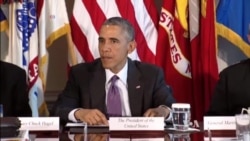Islamic State (IS) fighters are continuing their push into the mostly Kurdish Syrian border town of Kobani, and the U.S. military says it is facing the "real possibility" that the town soon could fall to the extremist group.
U.S. forces have launched several air attacks, including 11 in the past two days, to help Kurdish fighters repel IS militants.
Kobani region premier Anwar Moslem told VOA the air raids have produced positive results.
"If coalition forces continue striking like this, they can prevent help coming to ISIL from neighboring towns," Moslem said. "With the help of U.S. and coalition jets, we can expel ISIL from Kobani and save the lives of these civilians," said Moslem, using an alternate acronym for the group.
Coalition limitations in Syria
At the Pentagon, however, spokesman Rear Admiral John Kirby warned that coalition air power has its limits.
"Air strikes alone are not going to do this, not going to fix this, not going to save the town of Kobani," Kirby said.
Moslem says thousands of women, children and elderly remain in Kobani and need help, but unlike humanitarian relief efforts at Iraq's Mt. Sinjar and the town of Amerli, Kirby says there are "no plans for a humanitarian relief mission in Kobani," because many citizens already have fled.
The Pentagon says coalition forces will continue to strike IS targets around the besieged Syrian town, but that the purpose of air strikes in Syria is to hurt the group's ability to command and control.
"It’s not just about Kobani," Kirby said. "You’re seeing them trying to retake or take new territory in Anbar province (in Iraq). We believe that they are largely in control of the town of Hit right now, which is not that far from Fallujah and Ramadi. And Fallujah and Ramadi are not that far from Baghdad."
Watch related video by Luiz Ramirez:
Turkey on the fence
This fighting against IS militants in Kobani is just a few kilometers away from Syria's border with Turkey, but the country's military has yet to enter the battle.
"They (the Turks) have to make their own decisions based on their internal politics, external threats," Colonel Steve Warren, another Pentagon spokesman, told VOA.
One fear in Turkey is that Kurds fighting IS militants in Syria are supporters of the Kurdistan Workers Party, or PKK, deemed a terrorist organization by both Turkey and the United States. However, Warren says the United States is not as concerned with the PKK because IS militants pose a "more immediate threat."
"They’ve chopped people’s heads off on TV. They’ve invaded Iraq. They’ve taken a sizeable chunk of northern Iraq. They’ve committed unspeakable atrocities throughout the region," Warren said.
‘Strategic patience’
Kirby said "strategic patience" is necessary in the long battle against IS militants, which could last for years. Warren said he is unaware of any forces from Syria's neighbors who have agreed to fight IS extremists in Syria alongside Syrian rebels, and officials say the coalition is not coordinating with the Free Syrian Army, Kurdish rebels, or the government of Syrian President Bashar al-Assad.
Officials say the coalition can take offensive ground measures against IS militants in Syria once the training of moderate Syrian rebels begins in Saudi Arabia, but that is still months away.
U.S Secretary of State John Kerry says he expects decisions about the role of Turkey and that of other countries in Syria to come within days.
A U.S. envoy, retired General John Allen, will be in Turkey Thursday and Friday for what Kerry says will be "long meetings."
Death toll, refugee surge
The British-based Syrian Observatory for Human Rights said the battle for Kobani has killed at least 400 people. The fighting has also forced nearly 200,000 residents and villagers from the area to flee and seek shelter across the frontier in Turkey.
At least 18 protesters were killed in Turkey when demonstrators took to the streets of the largely Kurdish southeast and in major cities like Istanbul and Ankara to demand the Turkish government protect Kobani.
Turkish President Recep Tayyip Erdogan said Tuesday Kobani may soon fall without support from outside ground troops. Turkey's parliament authorized the use of force against the Islamic State group, but the Turkish military has not intervened.






